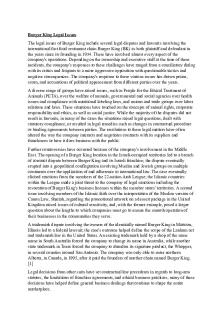Chapter 3 - Legal issues in nursing PDF

| Title | Chapter 3 - Legal issues in nursing |
|---|---|
| Author | Laura Hinojosa |
| Course | Nursing Skills II |
| Institution | Blinn College District |
| Pages | 4 |
| File Size | 58 KB |
| File Type | |
| Total Downloads | 61 |
| Total Views | 154 |
Summary
Legal issues in nursing...
Description
Chapter 3: Ethical and Legal Issues
Nurses are constantly faced with the challenge of making difficult decisions regarding good and evil or life and death. Legislation determines what is “right” or “good” within a society. Ethics: A branch of philosophy that deals with distinguishing right from wrong Bioethics: Term applied to ethics when they refer to concepts within the scope of medicine, nursing, and allied health Moral behavior: Conduct that results from serious critical thinking about how individuals should treat others Core Concepts Values: Personal beliefs about what is important and desirable §Values clarification: A process of self-exploration by which people identify and rank their own personal values Right: A valid, legally recognized claim or entitlement, encompassing both freedom from government interference or discriminatory treatment and entitlement to a benefit or service Core Concepts Absolute right: When there is no restriction whatsoever on the individual’s entitlement Legal right: A right that society has agreed upon and formalized into law Ethical Considerations Theoretical perspectives Utilitarianism: An ethical theory that promotes action based on the end result that produces the most good (happiness) for the most people Kantianism: Suggests that decisions and actions are bound by a sense of duty Ethical Considerations (continued) Christian ethics: Do unto others as you would have them do unto you. “The Golden Rule” Christian ethics: Do unto others as you would have them do unto you. “The Golden Rule”
Natural law theories: Do good and avoid evil. Human knowledge of the difference between good and evil directs decision-making. Ethical egoism: Decisions are based on what is best for the individual making the decision. Ethical Dilemmas Ethical dilemmas are situations that require individuals to make a choice between two equally unfavorable alternatives. Taking no action is considered an action taken. Ethical Principles Autonomy emphasizes the status of persons as autonomous moral agents whose rights to determine their destinies should always be respected. Beneficence refers to one’s duty to benefit or promote the good of others. Nonmaleficence: Abstaining from negative acts toward another; includes acting carefully to avoid harm. Ethical Principles Justice: Principle based on the notion of a hypothetical social contract between free, equal, and rational persons. The concept of justice reflects a duty to treat all individuals equally and fairly. Veracity: Principle that refers to one’s duty to always be truthful. Veracity: Principle that refers to one’s duty to always be truthful. A Model for Making Ethical Decisions §Assessment §Problem identification §Planning §Implementation §Evaluation Ethical Issues in Psychiatric/Mental Health Nursing All clients whom a nurse attends to have the following rights: The right to treatment The right to refuse treatment (including medication) The right to the least restrictive treatment alternative Legal Considerations The Nurse Practice Act defines the legal parameters of professional and practical nursing. Types of laws Statutory law Common law
Classifications Within Statutory and Common Law Civil law: Protects the private and property rights of individuals and businesses Torts Contracts Criminal law: Provides protection from conduct deemed injurious to the public welfare Legal Issues in Psychiatric/Mental Health Nursing Confidentiality and right to privacy Health Insurance Portability and Accountability Act (H I P A A) • Doctrine of privileged communication Exceptions: A duty to warn; suspected child or elder abuse Informed consent Restraints and seclusion False imprisonment Hospitalization Voluntary admissions Involuntary commitments Emergency commitments Involuntary commitments Emergency commitments A mentally ill person in need of treatment • Involuntary outpatient commitment A gravely disabled client Nursing Liability Negligence Failure to exercise the care toward others that a reasonable or prudent person would do in the circumstances. Malpractice Act or continuing conduct of a professional that does not meet the standard of competence and results in provable damages to the patient Types of Lawsuits that Occur in Psychiatric Nursing Breach of confidentiality
Defamation of character Libel Slander Invasion of privacy §Assault and battery §False imprisonment As a threat to others, the client can be restrained despite objections and voluntary commitment. Avoiding Liability Effective communication Accurate and complete documentation in the medical record §Complying with standards of care Knowing the client Practicing within the nurse’s level of competence and scope of practice...
Similar Free PDFs

Legal Liabilities in Nursing
- 12 Pages

Burger King Legal Issues
- 1 Pages

Identifying legal issues
- 3 Pages

Legal uworld nursing
- 5 Pages

Legal Aspects of Nursing
- 5 Pages
Popular Institutions
- Tinajero National High School - Annex
- Politeknik Caltex Riau
- Yokohama City University
- SGT University
- University of Al-Qadisiyah
- Divine Word College of Vigan
- Techniek College Rotterdam
- Universidade de Santiago
- Universiti Teknologi MARA Cawangan Johor Kampus Pasir Gudang
- Poltekkes Kemenkes Yogyakarta
- Baguio City National High School
- Colegio san marcos
- preparatoria uno
- Centro de Bachillerato Tecnológico Industrial y de Servicios No. 107
- Dalian Maritime University
- Quang Trung Secondary School
- Colegio Tecnológico en Informática
- Corporación Regional de Educación Superior
- Grupo CEDVA
- Dar Al Uloom University
- Centro de Estudios Preuniversitarios de la Universidad Nacional de Ingeniería
- 上智大学
- Aakash International School, Nuna Majara
- San Felipe Neri Catholic School
- Kang Chiao International School - New Taipei City
- Misamis Occidental National High School
- Institución Educativa Escuela Normal Juan Ladrilleros
- Kolehiyo ng Pantukan
- Batanes State College
- Instituto Continental
- Sekolah Menengah Kejuruan Kesehatan Kaltara (Tarakan)
- Colegio de La Inmaculada Concepcion - Cebu










